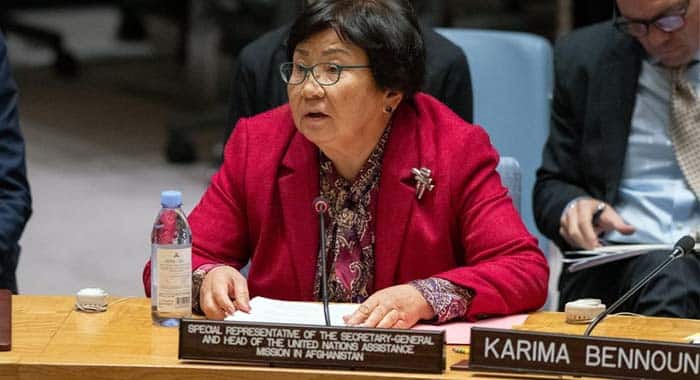Roza Otunbayeva, the UN Secretary-General’s Special Representative for Afghanistan, has concluded her two-year mission, departing a country gripped by humanitarian collapse, economic ruin, and global isolation under the Taliban’s unrecognised regime.
In her farewell meeting with Abdul Kabir, the Taliban’s acting Minister for Refugees, Kabir offered gratitude for the UN’s humanitarian efforts. Yet, international observers note that much of the aid delivered during her tenure was frequently obstructed, diverted, or politicised by the Taliban, deepening mistrust between the regime and the global community.
Otunbayeva underlined the UN’s commitment to continue supporting vulnerable Afghans despite the hostile environment. She pointed out that 25 working groups had been deployed to disaster-hit provinces and announced a $23 million project targeting migration challenges in northern Afghanistan, with subsequent phases planned in Nimroz and Farah.
Her departure comes at a time when Afghanistan faces overlapping emergencies mass displacement, widespread hunger, collapsed institutions, and recurring natural disasters — compounded by a regime that has rolled back women’s rights, stifled dissent, and left the country without international legitimacy. Donors continue to bypass Taliban ministries, funnelling aid exclusively through humanitarian agencies to prevent misuse and corruption. Rights groups have repeatedly accused the Taliban of exploiting aid for political purposes, worsening the plight of ordinary Afghans.
Otunbayeva’s mandate expires in September, following confirmation by the UN Security Council. She is due to deliver her final report at a council session later this month, where civil society representatives and the UN High Commissioner for Human Rights will also brief on Afghanistan’s deteriorating situation.
Appointed in September 2022 by UN Secretary-General António Guterres, Otunbayeva also led the UN Assistance Mission in Afghanistan (UNAMA). A former president of Kyrgyzstan, she faced the unenviable task of sustaining aid flows into a country where the ruling authorities remain unrecognised and isolated from the international system.
Her successor will inherit a bleak landscape: a pariah state under Taliban control, crippled by economic collapse, dependent on foreign aid, and unable to guarantee even the most basic rights of its citizens. For millions of Afghans, survival continues to hinge on international assistance — delivered in spite of, rather than through, the country’s rulers.





